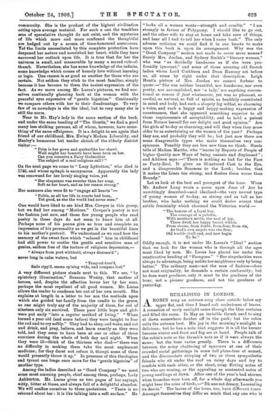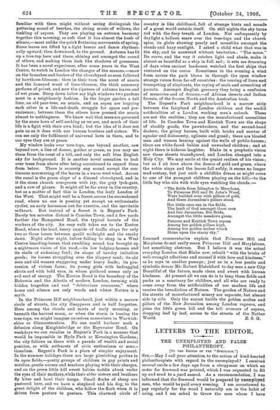RURALISING IN LONDON.
AROBIN sang an autumn song close outside below my upper flat, and then I heard soft undertones of leaves. A. sensation of early sunlight came through the blue curtains and filled the room. In May an invisible thrush used to sing at dawn somewhere farther off in the park; but the robin suits the autumn best. His joy in the morning's sunlight is delicious; but be has a note that suggests it is all the keener because winter and frost and fog are at hand. People talk of the robin's note or the thrush's note as if it were always the same; but the tone varies greatly. There is a difference between the noisy chattering of sparrows at one of their crowded social gatherings in some tall plane-tree at sunset, and the disconsolate chirping of two or three sympathetic friends who sit under the roof on rainy days and try to condole with each other, or the short, crisp flirting notes of two who are wooing, or the appealing or contented notes of young nestlings at dawn. After one of the year's bad storms, when branches were torn off, for a whole day afterwards you might bear the cries of birds,—" Ilk ane sat dreary, Lamenting its dearie." The leaves of the trees, too, have different tones. Amongst themselves they differ so much that any one who is
familiar with them might without seeing distinguish the pattering sound of beeches, the string music of willows, the tinkling of aspens. They are playing an autumn harmony together this morning, so soft that it has almost the hush of silence,—most unlike the quick fluttering movements of spring. Some leaves are lifted by a light breeze and dance rhythmi- cally upward, then downward, to the ground. Autumn has lit up a tree-top here and there, shining out amongst the crowd of others, and making them look like shadows of greenness. It has been a novel experience, after some years in the West Centre, to watch in London the changes of the seasons,—snow on the branches and .bushes of the churchyard so soon followed by hawthorn-blossom ; then in their turn the scent of acacia and the honeyed scent of lime-blossom, the thick summery perfume of privet, and now the ripeness of autumn leaves and of wet grass. Steep down below my high windows two gardens meet in a neighbourly fashion. In the larger garden a tall lime, an old pear-tree, an acacia, and an aspen are bugging each other in • a life-and-death struggle for space and pre- eminence ; between them the others have pressed the acacia almost to nothingness. We know well that trees are governed by the same laws of self-seeking as we are, and much of their life is a fight with their own kind ; but the idea of it does not pain us as it does with our human brothers and sisters. We can see only the fulfilment of universal laws in them, and to our eyes they are at peace.
My window looks over tree-tops, one beyond another, row -beyond row, a line of domes, golden or green, as you may see them from the creet of a bill, and only the soft blue English sky for background. It is another novel sensation to look over trees from above after being accustomed to regard them from below. There is scarcely any sound except the con- tinuous murmuring of the leaves in a warm west wind. Across the canal is the green slope of a disused churchyard, and in it the stone church overgrown with ivy, the grey lych-gate, and a row of planes. It might all be far away in the country. but as a matter of fact this is London, the leafy London of the West. That might well be a forest across the nnawakened road, where no one is passing yet except an enthusiastic cyclist, an early horseman out for exercise, and the inevitable milkcart. But instead of a forest it is Regent's Park. Barely ten minutes distant is Camden Town, and a few yards further the Hampstead Road, the typical haunts of the workers of the city. An easy walk takes me to the Euston Road, where the loud, heavy rumble of traffic stops for only two or three hours between gaslit midnight and the smoky dawn. Night after night, before falling to sleep in a West -Centre boarding-house, that rumbling sound has brought up a nightmare vision of the road,—its low lodging-houses and its stalls. of sickening food; its shops of tawdry imitation goods; its horses struggling over the slippery mud; its old men and old women staggering under heavy loads; its pro- cession of vicious faces; its young girls with bedraggled .skirts and with bold eyes, in whom girlhood seems only an evil sort of energy. The Easton Road is the boundary of the Bohemia and the Alsatia of modern London, teeming with hidden tragedies and real "deleterious romances," where home and silence are only words and where Nature is a myth.
In the Primrose Hill neighbourhood, just within a narrow circle of streets, the city disappears and is half forgotten. Here among the clouds and mists of early morning, or beneath the harvest moon, or when the storm is tossing the tree-tops, we might imagine ourselves somewhere in Warwick- shire or Gloucestershire. No one could harbour such a delusion along Knightsbridge or the Bayswater Road. On weekdays we can ruralise in Regent's Park in a manner that would be impossible in Hyde Park or Kensington Gardens; the city follows us there with a parade of wealth and social . position, or with outbursts of civic enthusiasm or sens::- tionalism. Regent's Park is a place of simpler enjoyment. In the summer holidays there are large picnicking parties in its open fields,—pretty groups of children in gay prints and muslins, gentle nurses and teachers playing with their charges, and on the green little hill sweet babies toddle about under the eyes of their mothers,while their elder sisters and brothers fly kites and bowl their hoops. Small flocks of sheep are pastured here, and we have a shepherd and his dog, to the great delight of the children, who follow the flock when it is driven from pasture to pasture. This charmed circle of country is like childhood, full of strange hints and sounds of a great world outside itself. On still nights the sky. turns red with the fiery breath of London. Not unfrequently by daylight a balloon soars over the tree-tops and the church spire, its globe showing pearly and moonlike amongst the clouds and hazy sunlight. I asked a child what that was in the sky, and he answered without hesitation: "The moon." Its curve, and the way it catches light and shade, make it almost as beautiful as a ship in full sail; it sets me dreaming of days when ancient landsmen watched the first ships that ventured on the ocean. Sometimes in the evening a wind from across the park blows in through the open window strange voices from far-off countries : the roaring of lions and trumpeting of elephants, the crying of seals and screeching of parrots. Amongst English greenery they bring a confusion of memories and of dreams,—of African deserts and Indian forests, of the frozen North and the Australian bush.
The Regent's Park neighbourhood is a narrow strip between the fairyland of London children and the sordid artificialities of a London working men's suburb. These are not the realities ; they are the manufactured unrealities of life. In Camden Town and Kentish Town are the shops of shoddy goods, the pawnbrokers, and the second-hand dealers; the grimy houses, built with bricks and mortar of squalor and dishonesty, ugliness and greed ; there are bloated men and women leaning against the walls of public-houses ; there are white-faced babies and unwashed children ; and at night there is hideous laughter. Blake in a prophetic vision saw these streets transfigured, and London changed into a Holy City. We may smile at the quaint realism of his vision; but as I sit here above the domes of gold and green, where the robin sings and the leaves fall softly, it seems no longer
mad ecstasy, but just such a childlike dream as might come to one of the youngest children playing on the hill,—to the little boy who sits with wide eyes watching the clouds :— "The fields from Islington to Marybone, To Primrose Hill and St. John's Wood, Were bnilded over with pillars of gold, And there Jerusalem's pillars stood.
Her little ones ran in the fields, The lamb of God amongst them seen And fair Jerusalem, His Bride, Amongst the little meadows green.
Pancras and Kentish Town repose Among her golden pillars high, Among her golden arches which Shine upon the starry sky."
Learned commentaries explain that Primrose Hill and Marybone do not really mean Primrose Hill and Marylobene, but something abstruse. But I believe it was the actual everyday London that Blake saw, rebuilt "with the bricks of well-wrought affections and enamel'd with love and kindness,"
25 he says in another passage; just as in a less poetic and symbolic dream Mr. Robert Blatchford to-day sees a new City
Beautiful of the future, made clean and sweet with human kindness. At present all we can do is to keep these fields and parks as a sanctuary for children, and all who are ready to come away from the artificialities of our modern life and receive the benediction of Nature. The garden of Nature and the streets of manufactured misery are separate, but almost side by side. Only the sunset builds the golden arches and pillars of the New Jerusalem among London vapours, and joins the little green bill and the tall avenues of aspens, dropping leaf by leaf, across to the streets of the Nether















































 Previous page
Previous page